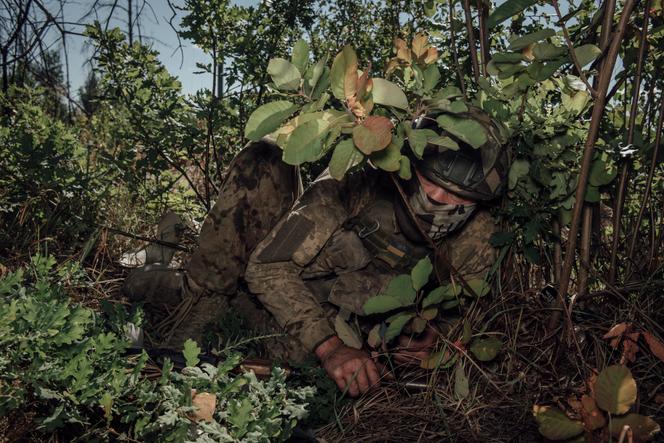


It was 7 am, the air was still cool and dozens of civilians were already waiting outside the army recruitment center. The guards opened the heavy doors to clusters of men and grim-faced women, often mothers dragging their children by the arm. Some of the women were wracked with sobs. "We call it the place of tears," said Yuri Nesterenko, a 49-year-old former front-line soldier who was reassigned to this recruitment center on the outskirts of Kyiv following an injury. Over the past few months, the recruitment of new soldiers has picked up speed.
All had answered the call of their relatives, who had been arrested the day before by recruiting agents as they went about their business in the city of Kyiv. On Tuesday, September 24, behind the walls of the large complex, around 100 of them were waiting to see their families one last time before leaving.
Among them was 25-year-old Oleg, a double-degree engineering graduate. The young man was arrested in the metro. His military documents had not been updated, so recruiters took him away. "He was happy to see us," said Volodymyr Valovyi, 21, who traveled with part of the family to see his cousin. "He was worried that he wouldn't be able to see his family before he left," said the student, who'd been warned by text message.
The family had packed a few things for him: "Medicine, clothes, towels, underwear," said another cousin, Nazar Zakordonets, 21. "We would have liked him to have more time with the family before leaving," said Oleg's sister Daria. Their father has been fighting since the start of the war in Donbas in 2014.
"It was unexpected," Valovyi said, as "Oleg didn't want to serve." An employee at a large factory in the city, he was hoping to avoid mobilization because of his important role in the company. "But it didn't work." In a few hours, Oleg would depart, along with the dozens of other men arrested the day before, for one of the country's training centers. These daytime recruitment activities in the streets of towns and villages have a name in Ukraine: "busification," a mobilization after being arrested and taken away in a bus. "The state has to mobilize men," said Valovyi quietly, outside the recruitment center. "But it would be better if it were otherwise," he added.
This pace accelerated after the passage of several packages of legislation, bitterly received by Ukrainian society, aimed at boosting mobilization. In April, for example, the legal age for mobilization was lowered from 27 to 25, and men previously considered to have "limited fitness" for service were required to reappear before a medical commission. In May, the country's parliament also passed a law giving conscripts between 18 and 60 years of age 60 days to register their military documents, in order to streamline the process. Those who fail to do so risk being fined up to hundreds of euros, or having their driver's license revoked. In mid-July, the Ministry of Defense announced that 4.7 million Ukrainians had updated their data.
You have 52.7% of this article left to read. The rest is for subscribers only.
